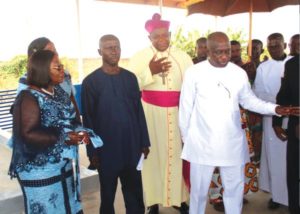
Sanitation has become a major challenge confronting our nation Ghana. It is time “we brighten the corner where we are”.
Gone are the days when information vans moved around communities and cities educating the people on their civic rights and responsibilities.
Officers from the Town Council popularly known then as ‘Tankasi’ moved around houses and communities to check on the neatness of surroundings.
Any landlord found wanting was summoned, ‘sama’ by the sanitation courts and fined. How and why did we stop this practice?
1978 Year Group
The 1978 Year Group of St Monica’s Secondary School, Mampong Ashanti, chose sanitation as its main project in celebrating 40 years after completion of their ‘Ordinary Level’ education.
In a year-long 40th anniversary celebration which culminated in a speech and prize-giving day recently, the group, supported by sponsors, planted 40 saplings of the ‘tree of life’, to symbolically mark its 40 years and make the compound very eco-friendly.
On two occasions, the year group brought in professionals to sensitise the entire school community, including staff and students to waste management.
They also organised a sanitation week in the school to educate the community on how to practicalise waste management, refurbished 68 broken down water closets in all the seven houses and constructed a new septic tank.
In addition, they provided bins to be placed at vantage points in the school to encourage waste segregation, demolished inappropriate structures which did not promote sanitation and cleared an open dumpsite which had been used by the school for over 30 years.
Furthermore, the year group built a compost shed with immense support by the Chief of Staff at the Jubilee House, Mrs Akosua Frema Osei Opare, who is also a past student of the school.
To crown their efforts, the 1978 year group sponsored the school’s 72nd speech and prize-giving day.
Benefits
The project is primarily to sensitise the students to good environmental management and to build in them a practical culture that can be extended to their own communities.
It was also to promote sustainable source separation on campus and demonstrate its applicability, and to recover reusable materials from the waste stream for use as secondary material through reuse and recycling.
Another benefit of the project is that it will promote a clean and healthy environment on campus which stimulates academic work and also ensure food security and reduce the use of inorganic fertilisers in vegetable growth.
Aside from these, it will serve as a practical example to explain some theories relating to science, agriculture, business management and research.
Recycled waste
In an interview, Mr Emmanuel Buasilenu – the head of the Science Department of the school, who doubles as an Agricultural Science teacher and the newly awarded 2017/2018 Best Teacher of the school – said plastics were separated and sold to recycling companies and the compost would be used for citrus and oil palm plantations to supplement feeding for the students and the excess sold to the general public.
Inauguration
The compost shed was inaugurated by Mrs Osei Opare, in the company of the Ashanti Regional Minister; Mr Simon Osei Mensah, the Primate of the Church of the Province of West Africa; the Archbishop of the Internal Province of Ghana and the Bishop of Kumasi, the Most Reverend Dr Daniel Yinkah Sarfo; the Diocesan Bishop of the Anglican Diocese of Asante-Mampong, the Rt Rev. Dr Cyril Ben-Smith; Nana Obugyei, Krontihene of Ejura, and his elders representing the Mamponghene, past students, management, staff and students of the school.
–
Daily Graphic



